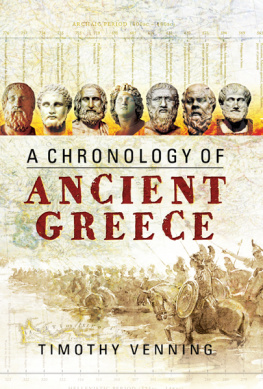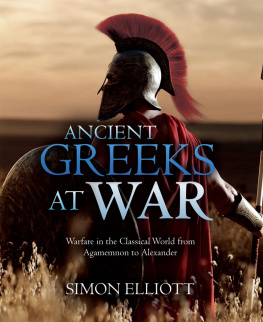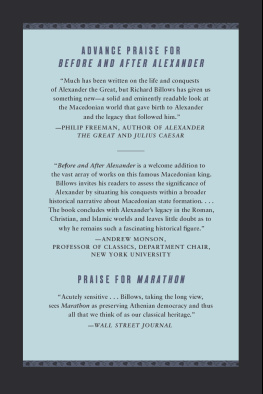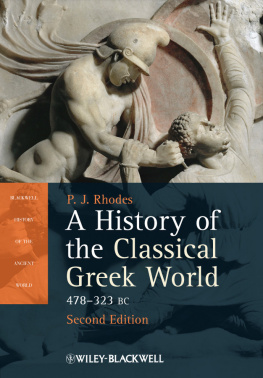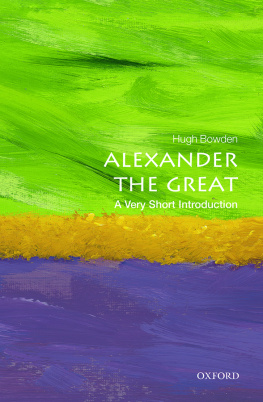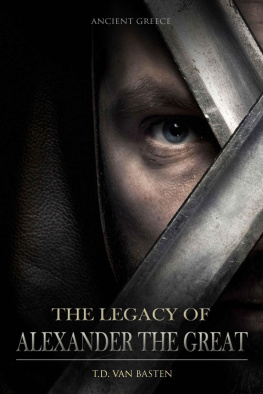THE GREEK WORLD AFTER ALEXANDER
In this comprehensive and well-documented book, Graham Shipley integrates the diverse aspects of politics, society and culture to create a coherent and thorough survey of the Hellenistic world.
The Greek World after Alexander examines social changes in the cities of the Greek world and in the kingdoms which succeeded Alexanders empire. The investigation is set in the context of an up-to-date appraisal of the momentous military and political changes that took place after Alexanders reign. Graham Shipleys ground-breaking study also considers developments in literature, religion, philosophy, and science, establishing whether they departed radically from Classical Greek culture or developed continuously from it. In addition, he explores the divisions in Hellenistic culture separating an educated lite from the general population which was more mobile than before but perhaps less involved in city politics.
The Greek World after Alexander offers an indispensable introduction to the Hellenistic world, and provides the reader with extensive translated source material and references for further study. It will be invaluable to students, teachers, and researchers alike.
Graham Shipley is Reader in Ancient History at the School of Archaeological Studies at the University of Leicester, and a Fellow of the Society of Antiquaries. He is the author of A History of Samos 800188 BC (1987) and the co-editor of several volumes of papers on Greek and Roman history. A longstanding member of the British School at Athens, he was editor of the Schools Annual for five years and is a co-author of the Laconia Survey.
ROUTLEDGE HISTORY OF THE ANCIENT WORLD
General Editor: Fergus Millar
THE ANCIENT NEAR EAST c. 3000330 BC
Amlie Kuhrt
THE GREEK WORLD 479323 BC
Simon Hornblower
THE BEGINNINGS OF ROME c. 1000264 BC
T.J. Cornell
THE MEDITERRANEAN WORLD IN LATE ANTIQUITY
AD 395600
Averil Cameron
GREECE IN THE MAKING 1200479 BC
Robin Osborne
THE ROMAN WORLD
44 BCAD 180
Martin Goodman
THE GREEK WORLD AFTER ALEXANDER
323 30 BC
Graham Shipley

First published 2000
by Routledge
Published 2014 by Routledge
2 Park Square, Milton Park, Abingdon, Oxon OX14 4RN
Simultaneously published in the USA and Canada
by Routledge
711 Third Avenue, New York, NY, 10017, USA
Routledge is an imprint of the Taylor & Francis Group, an informa business
2000 Graham Shipley
The right of Graham Shipley to be identified as the
Author of this Work has been asserted by him in accordance with the Copyright, Designs and Patents Act 1988
Typeset in Garamond by Taylor & Francis Books Ltd
All rights reserved. No part of this book may be reprinted or reproduced or utilised in any form or by any electronic, mechanical, or other means, now known or hereafter invented, including photocopying and recording, or in any information storage or retrieval system, without permission in writing from the publishers.
British Library Cataloguing in Publication Data
A catalogue record for this book is available from the British Library
Library of Congress Cataloging in Publication Data
A catalog record for this book has been requested
ISBN 13: 978-0-415-04617-6 (hbk)
ISBN 13: 978-0-415-04618-3 (pbk)
To my students and colleagues
at Leicester, past and present
CONTENTS
This survey of hellenistic society and culture took its initial inspiration from earlier works by Claire Praux and Frank Walbank, to whom I must acknowledge a substantial debt. Since the time when the book was planned in the early 1990s, however, there has been an upsurge of accessible writings, particularly in English, many of which are highlighted in the Further Reading section; these have made the task of assimilating a wide range of sources and historical events far simpler than it might have been.
Given its limited size, the work cannot pretend to complete coverage, particularly in areas where the author is not an expert. For particular topics and regions it will be obvious that I have relied heavily on earlier investigators; this is particularly the case with Egypt and the Seleukid empire, for I have no knowledge of the non-Greek languages. The book is designed to interlink two aspects often left disconnected in earlier studies: on the one hand, the political, economic, and administrative changes that took place after Alexander the Great, which are explored through examinations of distinct geographical areas (Macedonia, Greece, Seleukid Asia, and Egypt); on the other hand, the cultural and intellectual output of the period (religion, philosophy, and particularly literature and science). The latter, I believe, cannot be understood without the former. I am not the first to have suggested that the element of continuity from classical times may be at least as significant as the element of change. I would also submit that many of the new formations are evidence, not of changes in popular mentality, but of innovations in discourses conducted at an lite level of society; they were not without influence at the grass roots, but the degree of continuity in popular culture was surely far greater.
For making it possible for me to write the book I am grateful, first and foremost, to the University of Leicester for granting me study leave in 1993 and 1998 and additional research leave in 1999. The head of the School of Archaeological Studies, Graeme Barker, and my colleagues in the Ancient History and Archaeology Divisions deserve my appreciation for undertaking extra duties during my absences. I must also thank the Director of the British School at Athens, David Blackman, and his staff, particularly in the Library, for providing congenial surroundings in which to concentrate on research during 1998 and 1999. I am grateful to the Warden and Fellows of Wadham College, Oxford, for research facilities and accommodation during summer 1998. Final revision was carried out during the tenure of the Visiting Fellowship at the BSA and an award from the Research Leave Scheme of the UK Arts and Humanities Research Board.
Richard Stoneman and his colleagues at Routledge, particularly Coco Stevenson, have been sources of wisdom and practical advice whose value cannot be overstated. For practical help in selecting and obtaining illustrations I must thank Revel Coles, Charles Crowther, Heinrich Hall, Chris Howgego, Andy Meadows, and Marcella Pisani. The School of Archaeological Studies of the University of Leicester assisted with the cost of photographs. Others have been thanked privately or in the Acknowledgements; my apologies to anyone I have inadvertently omitted. The volume has benefited greatly from the intelligent copy-editing of Susan Dunsmore and the proof-reading of Laetitia Grant.
The teaching and supervision I received from Peter Derow and from the late George Forrest remain a source of inspiration in more ways than I can spell out. Colleagues and pupils who helped in more recent years by discussing the specific details or overall shape of the work, by making their own works available, or by reading particular sections include Jamie Bell, Dorothy Buchan, Lin Foxhall, Mogens Herman Hansen, Ioanna Kralli, Brian McGing, Cline Marquaille, Henrik Mouritsen, Graham Oliver, Katerina Panagopoulou, Martyn Richards, Athanasios Rizakis, Sarah Scott, Tyler Jo Smith, and Mark Steinhardt. Others are thanked in the Notes. My father, Donald Shipley, read several versions of the text and made many valuable suggestions and criticisms. I am especially grateful to Dorothy Thompson for helping me improve and revise , to John Davies for reading the entire draft text and making many perceptive and informative suggestions, and most of all to Fergus Millar for his invitation to write this book and for showing, by turns, patience, generosity, and critical acumen as a series editor.
Next page

